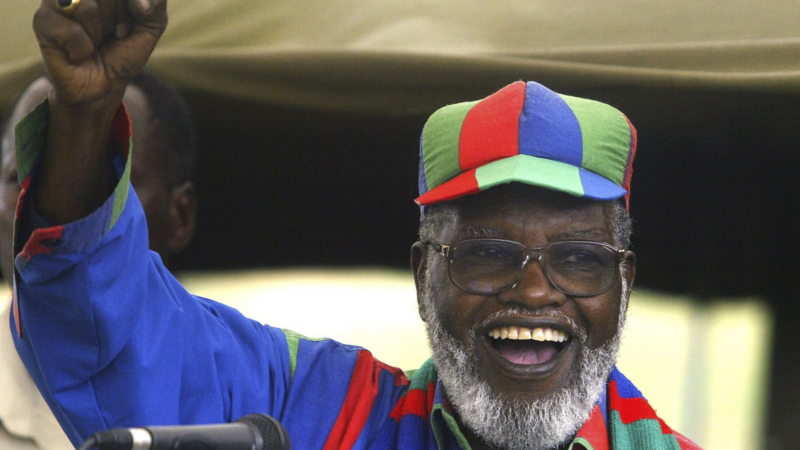Sam Nujoma, Namibia’s fiery freedom fighter and first president, dies aged 95
WINDHOEK, Namibia — Sam Nujoma, the fiery freedom fighter who led Namibia to independence from apartheid South Africa in 1990 and served as its first president for 15 years, and was known as the father of the nation, has died. He was 95.
Nujoma’s death was announced Sunday by current Namibian President Nangolo Mbumba. Mbumba said Nujoma died on Saturday night after being hospitalized in the capital, Windhoek.
“The foundations of the Republic of Namibia have been shaken,” Mbumba said in a statement. “Over the past three weeks, the Founding President of the Republic of Namibia and Founding Father of the Namibian Nation was hospitalized for medical treatment and medical observation due to ill health.”
“Unfortunately, this time, the most gallant son of our land could not recover from his illness,” Mbumba added.
Nujoma was revered in his homeland as a charismatic father figure who steered his country to democracy and stability after long colonial rule by Germany and a bitter war of independence from South Africa. He spent nearly 30 years in exile as the leader of its independence movement before returning to be elected his country’s first democratic leader in 1990.
Nujoma, with his trademark white beard, was the last of a generation of African leaders who brought their countries out of colonial or white minority rule that included South Africa’s Nelson Mandela, Zimbabwe’s Robert Mugabe, Zambia’s Kenneth Kaunda and Mozambique’s Samora Machel.
Many Namibians credited Nujoma’s leadership for the process of national healing and reconciliation after the deep divisions caused by the independence war and South Africa’s policies of dividing the country into ethnically based regional governments, with separate education and health care for each race.
Even his political opponents praised Nujoma — who was branded a Marxist and accused of ruthless suppression of dissent while in exile — for establishing a democratic Constitution and involving white businessmen and politicians in government after independence.
Despite his pragmatism and nation-building at home, Nujoma often hit foreign headlines for his fierce anti-Western rhetoric. He claimed AIDS was a man-made biological weapon and also occasionally waged a verbal war on homosexuality, calling gays “idiots” and branding homosexuality a “foreign and corrupt ideology.”
Nujoma built ties with North Korea, Cuba, Russia and China, some of which had supported Namibia’s liberation movement by providing arms and training.
But he balanced that with outreach to the West, and Nujoma was the first African leader to be hosted at the White House by former U.S. President Bill Clinton in 1993. Clinton called Nujoma “the George Washington of his country” and “a genuine hero of the world’s movement toward democracy.”
Nujoma grew up in a rural, impoverished family, the eldest of 11 children. His early life revolved around looking after his parents’ cattle and the cultivation of land. He attended a mission school before moving to Windhoek and working for South African Railways.
He was arrested following a political protest in 1959 and fled the territory shortly after his release. In exile, he helped establish the South West African People’s Organization and was named its president in 1960. SWAPO has been Namibia’s ruling party since 1990.
When South Africa refused to heed a 1966 U.N. resolution ending its mandate over the former German colony of South West Africa, Nujoma launched SWAPO’s guerrilla campaign.
“We started the armed struggle with only two sub-machine guns and two pistols,” Nujoma once said. “I got them from Algeria, plus some rounds of ammunition.”
Taiwan’s president pledges to defend island’s sovereignty after Chinese military drills
Taiwanese President Lai Ching-te vowed to defend the self-ruled island's sovereignty in the face of what he termed China's "expansionist ambitions," days after Beijing wrapped up live-fire military drills near its shores.
Deaths reported during widening protests in Iran sparked by ailing economy
The protests began due to economic pressures, with Iran's currency rapidly depreciating. Demonstrators have also chanted against the country's theocracy.
Congress failed to extend Obamacare subsidies. This Democrat says Trump can save them
Sen. Peter Welch, D-Vt., says he thinks the Senate can pass a "retroactive" Affordable Care Act subsidy extension, but "we need President Trump."
Rideshare union rights, social media limits and other state laws taking effect Jan. 1
Every new year, public media reporters across the country bring us some of the new state laws taking effect where they are. Here are six in 2026.
Guides to help you tackle your New Year’s resolutions
From building your strength to tackling credit card debt, NPR's Life Kit has a newsletter journey to help you tackle your New Year's resolution.
Guides to help you tackle your New Year’s resolutions
From building your strength to tackling credit card debt, NPR's Life Kit has a newsletter journey to help you tackle your New Year's resolution.






